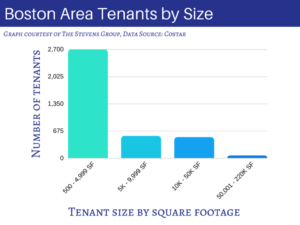It might be easy to dismiss small tenants and think that Boston landlords only care about the big deals. The Amazon, New Balance, Bose, GE size deals. But what about everyone else? What if you need a relatively small space?
Actually, based on the yearly number of transactions, small tenants form the majority of commercial real estate leases in the Boston area. The Stevens Group, a Boston-based tenant representation group, found that out of all the leases signed in the past year, more than 70 percent of the tenants were in the smallest square footage range.
These numbers make it very obvious how many landlords have smaller spaces to fill. Just in 2017, the number of tenants leasing commercial space under 5,000 SF was easily double the number of transactions of all larger tenants combined.
There were nearly 2,700 leases for tenants under 5,000 SF, while there were only 66 new leases for the largest sized tenants.
But for most landlords who own buildings and pay mortgages, a bunch of small empty spaces adds up, according to Amanda Stevens Snell, principal at The Stevens Group.
“When you combine the income generated from multiple small spaces within a building, it contributes greatly to the overall rents collected by the landlord, and the Boston commercial real estate market as a whole,” Snell said.
Small Spaces Add Up
When a landlord has a mortgage to pay, many small vacant spaces can cost them. The trick is finding the landlords who need these tenants most. Without those small leases, many landlords would be out of business.
Although some brokers are not interested in “small” tenants, these tenants still matter a great deal. Again, this is 70 percent of the leases in one year, a huge portion of the market.
For a tenant representation firm like The Stevens Group, who exclusively represent tenants and never landlords, even the small leases are complicated and require a great deal of attention. By representing exclusively their clients’ interests, this helps put “the little guy” on level footing with big landlords, said Debra Stevens, principal at The Stevens Group. “We love protecting our 2,500 square-foot tenants — this way we help them become our 70,000 square-foot tenants.”
Getting a Good Deal on a Small Space
Small tenants should expect landlords to take their business seriously. As an asset class with other small businesses, they are a significant portion of a landlord’s revenue. Based on this, it is crucial to understand the tenants worth to a given landlord. Tenants who undervalue their own worth are also in danger of undervaluing their leverage in a negotiating scenario.
Besides this, the reality is that small tenants rarely occupy space in buildings alongside large corporate tenants. Big corporations tend to take up multiple floors, if not whole buildings. Floor plans tend to get divided with a large corporate tenant in their own building or on a dedicated floor.
Small tenants, on the other hand, tend to be grouped together. Many buildings cater to smaller tenants. In fact, the majority of commercial real estate is often occupied by collections of small tenants in large buildings. In these buildings especially, smaller tenants certainly matter. Landlords in these buildings spend most of their time dealing with small tenants.
Small tenants shouldn’t be afraid to do research, negotiate for their needs, and ask for what is fair. Their landlords can’t afford to lose them.
About The Stevens Group
We Only Work on Behalf of Tenants, Not Landlords. The Stevens Group is a Boston based commercial real estate advisory firm specializing in providing tenant representation services to corporate clients exclusively, assisting them in the leasing, acquisition and disposition of commercial real estate. We provide our clients with the most complete, unbiased real estate advice and the most cost-efficient systems in tenant representation.
Conflict Free Representation. We act as an advocate on behalf of tenants and buyers to identify the most appropriate options and negotiate the best possible terms on their behalf. By not representing landlords or developers we are able to effectively, and without conflict of interest, identify properties which are optimally suited to a corporate client’s needs and negotiate the most favorable terms to maximize savings and reduce risk.
For more information on The Stevens Group and tenant representation services, visit https://thestevensgrp.com/ or follow us on LinkedIn and Twitter.
